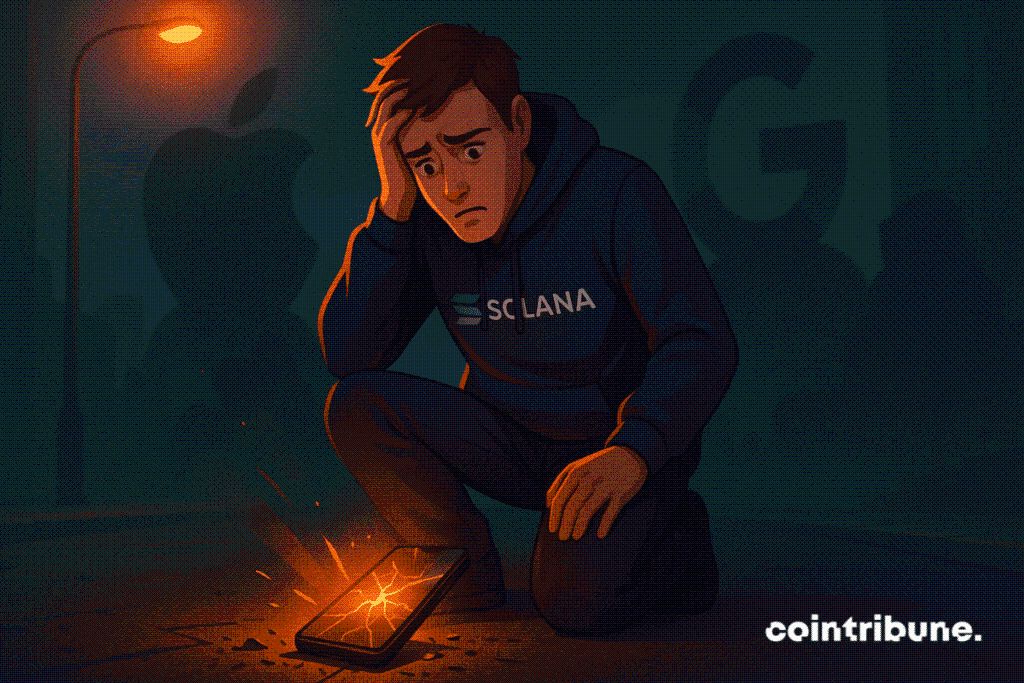Solana ends support for its Saga smartphone after only 2 years
Solana Mobile turns the page on its first crypto smartphone. The Saga, launched in 2023, will no longer receive updates or security patches. Only two years after its market arrival, the device is abandoned. An early obsolescence that contrasts with the standards of Apple and Google.

In brief
- Solana Mobile ends Saga support: no more software updates or security patches for the 20,000 devices sold.
- An ultra-short lifecycle: only two years, compared to seven years at Apple and Google.
- All efforts now focus on the Seeker, with over 150,000 preorders and a new ecosystem token planned.
- Saga’s crypto features remain operational, and wallets can be transferred to other devices.
Premature end for Solana’s Saga smartphone
Solana Mobile officially announced on Monday the abandonment of the Saga. The owners of the 20,000 produced units will no longer receive any updates.
” Software updates and security patches are no longer available for Saga devices“, confirmed a representative on the official Discord.
The phone will remain functional but fixed on Android 14 and its last patch from November 2024.
This announcement surprises by its speed. The Saga was marketed in April 2023. Its support ends after barely 26 months of existence. For comparison, Apple only classifies its iPhones as “obsolete” after seven full years. Google and Samsung also offer seven years of support for their flagship devices. The gap is huge.
The company justifies this decision by a strategic refocus on the Seeker, its second-generation phone. But for early adopters, the bill is bitter. Certainly, crypto features continue to work.
Wallets can even be restored on other devices thanks to the “same seed standard.” However, the absence of security patches exposes these devices to increasing vulnerabilities.
The Seeker to erase past mistakes
Solana Mobile puts everything on its new champion. The Seeker , launched at 500 dollars, costs half as much as the Saga at its debut. It has already recorded over 150,000 preorders and the first shipments began in August. A success which sharply contrasts with the failed start of its predecessor.
Solana’s first crypto smartphone had a catastrophic launch. Sales stagnated until a series of generous airdrops changed the game at the end of 2023.
Holders were then able to collect several thousand dollars in free tokens, triggering a rush for the remaining stock available. A lesson from which the company seems to have benefited.
The Seeker features notable improvements: brighter screen, enhanced battery, redesigned interface. It retains the Seed Vault to secure private keys and offers an enhanced decentralized app store.
The major innovation? The SKR token, designed to align the interests of developers and users. Details remain vague, but Solana Mobile promises a participatory economy around this ecosystem.
The company goes further by integrating TEEPIN, a security system that validates hardware and software without a centralized intermediary. No more Google or Apple to authorize apps. Everything relies on cryptography.
More than 100 native Web3 apps are already available at launch, from DeFi to gaming to NFTs .
In short, the Saga case reveals Solana Mobile’s Achilles’ heel: durability. Two years of support do not compare to the seven guaranteed by the competition. The 150,000 Seeker buyers are taking a calculated risk. It remains to be seen if the company will this time honor its long-term commitment. Because in the mobile universe, trust is built over years, not press releases.